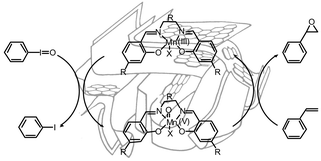A manganese(III) N2O2 Schiff base complex functionalised with hydroxyl groups on the aldehyde moieties, [Mn(4-HOsalhd)CH3COO], was immobilised onto a commercial activated carbon and on its air and acid oxidised forms: the unfunctionalised manganese(III)
salen complex [Mn(salhd)Cl] was also immobilised onto the air oxidised activated carbon. All the materials were characterised by elemental analyses and by XPS and the type of oxygen functionalities present at the surface of the various activated carbons was characterised by TPD. The catalytic activities in the epoxidation of styrene of the manganese(III)
salen complexes in homogeneous phase and heterogenised onto the activated carbon based materials were studied, using iodosylbenzene as oxidant and acetonitrile as solvent. All the heterogeneous catalysts are as chemoselective towards the styrene epoxide as their homogeneous counterparts, with the exception of the complex supported onto the nitric acid oxidised activated carbon, which exhibited the lowest values, a consequence of the catalytic role of the support. Catalyst reutilisation studies showed that the hydroxyl functionalised manganese(III) complex supported onto the two oxidised activated carbons kept the catalytic activity, contrasting with the hydroxyl functionalised manganese(III) complex supported onto the untreated activated carbon and the unfunctionalised manganese(III) complex supported onto the air oxidised activated carbon, for which a decrease in styrene epoxide yield was clearly observed. These results indicate that lack of oxygen functionality on the activated carbon or of complex functionalisation results in the deactivation of the manganese(III)
salen based heterogeneous catalyst as a consequence of inefficient active phase anchoring. Conversely, the combination of support oxidation and of suitable complex functionalisation leads to the establishment of a covalent attachment of the hydroxyl functionalised Mn(III) complexes onto the carbon surface oxygen groups that retains an efficient site isolation of the complexes, both needed to produce very stable and reusable catalysts.

You have access to this article
 Please wait while we load your content...
Something went wrong. Try again?
Please wait while we load your content...
Something went wrong. Try again?


 Please wait while we load your content...
Please wait while we load your content...